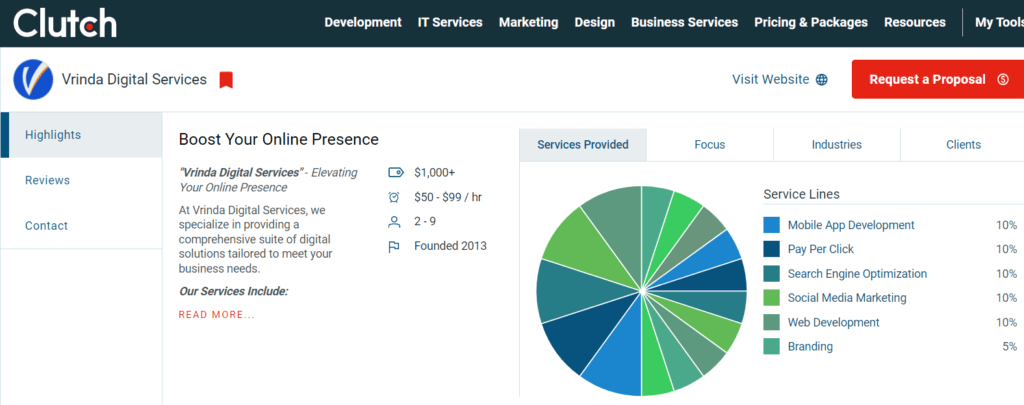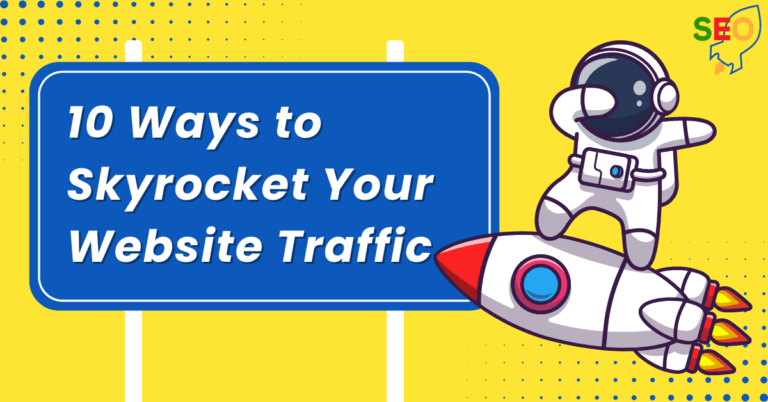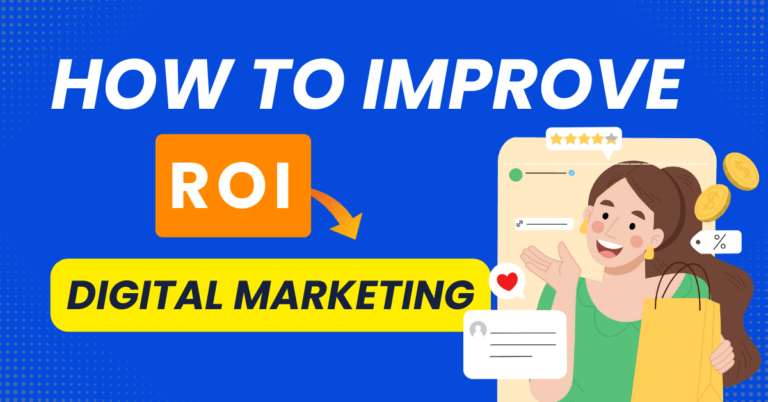Hey there! So, you’re thinking about choosing a digital marketing agency? That’s a smart move.
Let’s break it down step by step so you feel confident about making the right choice. We’ll cover what a digital marketing agency is, why choosing the right one matters, and the benefits of hiring one. Ready? Let’s dive in.
Table of Contents
What is a Digital Marketing Agency?
A digital marketing agency helps businesses grow online. They use tools and strategies like social media, SEO, and email marketing to boost your brand’s presence on the internet.
Imagine having a team of experts who live and breathe digital trends – that’s what you get with a digital marketing agency. They work to get your business noticed by the right people, turning clicks into customers.
Why Hire a Digital Marketing Agency?
(a) Importance of Choosing the Right Agency
Now, why is picking the right agency so crucial? Think of it like finding the right partner.
You want someone who understands your goals, communicates well, and aligns with your values. A good agency will tailor their approach to fit your specific needs, rather than offering a one-size-fits-all solution.
This personalized strategy is essential because it maximizes your investment and ensures your marketing efforts hit the mark. Choosing the wrong agency can be a costly mistake.
You might end up wasting time and money on campaigns that don’t work. Worse, a bad agency might use outdated or shady practices that could harm your online reputation.
So, it’s worth spending some time finding an agency that truly gets what you’re about and has a proven track record of success.
(b) Benefits of Hiring a Digital Marketing Agency
Alright, let’s talk about the good stuff – the benefits of hiring a digital marketing agency. First off, you get access to a team of experts.
These folks are pros at what they do. They stay on top of the latest trends and technologies, so you don’t have to.
This means you get the most effective strategies and tools working for you. Another big benefit is time.
Running a business is already a full-time job. Trying to manage your digital marketing on top of that can be overwhelming.
By hiring an agency, you free up your time to focus on what you do best – running your business. Plus, agencies have the resources to implement campaigns quickly and efficiently, which means faster results for you.
Cost-effectiveness is another advantage. While it might seem like an added expense, hiring an agency can actually save you money in the long run.
They have the expertise to avoid costly mistakes and can often get better rates on advertising. Plus, they’ll help you maximize your ROI by targeting the right audience with the right message at the right time.
Finally, let’s not forget about scalability. As your business grows, your marketing needs will change.
A good digital marketing agency can scale their services to match your evolving needs, providing more support and resources as required. This flexibility is crucial for sustained growth and long-term success.
Choosing the right digital marketing agency is a key decision for your business. It’s about finding a partner who understands your vision and can help you achieve your goals.
The right agency will offer expert knowledge, save you time and money, and provide the flexibility to grow with your business. So, take your time, do your research, and choose wisely – your business deserves the best.
For more insights on the benefits of digital marketing, check out this detailed study by HubSpot.
Alright, let’s move on to the next part. Understanding your needs is crucial before you start looking for a digital marketing agency. This will help you find a partner that truly fits your business.
How to Find the Right Digital Marketing Agency?
Step 1: Understanding Your Needs
(a) Assessing Your Current Marketing Strategy
First things first, take a good look at your current marketing strategy. What’s working and what’s not?
Evaluate your current campaigns, social media presence, website traffic, and SEO performance. Are you reaching your target audience?
This assessment helps you pinpoint where you need help. Maybe your social media game is strong, but your SEO needs a boost.
(b) Defining Your Goals and Objectives
Next, get clear on your goals and objectives. What do you want to achieve with your digital marketing efforts?
Are you looking to increase brand awareness, generate more leads, or boost sales? Be specific.
Clear goals will guide your strategy and make it easier to measure success. For example, instead of saying “I want more traffic,” aim for “I want a 10% increase in website traffic over the next three months.”
(c) Identifying Specific Areas of Expertise Needed
Finally, identify the specific areas of expertise you need. Digital marketing is a broad field, and different agencies have different strengths.
Do you need help with content creation, social media management, SEO, PPC, or email marketing? Knowing what you need makes it easier to find an agency with the right skills.
If you’re not sure, look at your assessment again. Where are the gaps?
Choosing an agency with the right expertise ensures they can effectively address your needs. Plus, specialized agencies often bring deeper insights and more innovative strategies to the table.
Understanding your needs is a crucial step in finding the right digital marketing agency. By assessing your current strategy, defining clear goals, and identifying specific areas of expertise, you’ll be well-prepared to choose a partner that can help you achieve your business objectives.
Now that you know what to look for, let’s move on to the next step: researching potential agencies. This step is all about finding and evaluating possible partners to see who might be the best fit for your business.
Step 2: Researching Potential Agencies
(a) Online Search and Directories
Start with a simple online search. Use keywords related to your needs, like “top SEO agencies” or “best social media marketing firms.”
Online directories like Clutch, UpCity, and G2 can also be incredibly useful. They list agencies, along with reviews and ratings from clients.
These directories can help you get a sense of an agency’s reputation and capabilities. Look for agencies with high ratings and positive feedback.
(b) Asking for Referrals and Recommendations
Don’t underestimate the power of word-of-mouth. Ask for referrals from colleagues, friends, or other business owners.
People in your network who’ve had a good experience with a digital marketing agency can provide valuable insights. They can tell you about the agency’s work ethic, communication style, and results.
Referrals often come with honest opinions and can save you a lot of time in your search. Plus, a recommended agency is likely to take good care of you, knowing their reputation is on the line.
(c) Reviewing Case Studies and Portfolio
Once you’ve identified some potential agencies, dive into their case studies and portfolio. This is where you can see their work in action.
Look for case studies that align with your industry or the type of campaign you need. These examples show how the agency approaches challenges and delivers results.
A strong portfolio will showcase a variety of projects, demonstrating the agency’s versatility and expertise. Pay attention to the specifics – what were the goals, strategies, and outcomes?
Researching potential agencies thoroughly helps ensure you find a partner that’s well-matched to your needs. By combining online searches, referrals, and portfolio reviews, you can gather a comprehensive view of an agency’s capabilities and reliability.
Next up, let’s discuss how to evaluate these agencies once you have a shortlist. This step is crucial for ensuring that you choose a partner who can deliver the results you need.
Step 3: Evaluating Agency Expertise and Experience
(a) Industry Experience and Specialization
First, check if the agency has experience in your industry. Have they worked with businesses similar to yours before?
Industry-specific experience means they understand your market and target audience better. It also means they’re familiar with the challenges and opportunities unique to your field.
Look for agencies that specialize in your required areas, whether it’s SEO, PPC, social media, or content marketing. Specialization often translates to deeper knowledge and more effective strategies.
(b) Client Testimonials and Reviews
Next, take a look at client testimonials and reviews. What do other businesses say about working with the agency?
Positive testimonials and high ratings are good indicators of an agency’s reliability and performance. Pay attention to what clients highlight – are they happy with the communication, creativity, and results?

Check multiple sources for reviews, including the agency’s website, Google, and third-party directories like Clutch. Consistent positive feedback across different platforms is a strong trust signal.
(c) Team Qualifications and Certifications
Finally, evaluate the qualifications and certifications of the agency’s team. Who will be working on your campaigns, and what are their credentials?
Look for certifications from recognized bodies like Google, HubSpot, or Facebook. These certifications show that the team is up-to-date with the latest tools and best practices.
You can also check the agency’s website for team bios, showcasing their experience and expertise. A well-qualified team is more likely to deliver innovative and effective marketing solutions.
Evaluating an agency’s expertise and experience involves looking at their industry specialization, client feedback, and team qualifications. This thorough evaluation helps ensure you choose a partner capable of meeting your business goals.
With this in mind, let’s continue by assessing the service offerings of potential digital marketing agencies. Knowing what services they offer and how they can tailor them to your needs is crucial in making your final decision.
Step 4:Assessing Service Offerings
(a) Comprehensive Digital Marketing Services
First, look at the range of services an agency provides. Do they offer a comprehensive suite of digital marketing services?
A full-service agency can handle all aspects of your digital marketing, from strategy and planning to execution and analysis. This means you won’t need to juggle multiple agencies for different needs, which can save time and ensure consistency in your campaigns.
Check if they offer services like SEO, PPC, social media management, content marketing, email marketing, and web design. The more comprehensive their offerings, the more flexible they can be in adapting to your changing needs.
(b) Specific Services: SEO, PPC, Social Media, Content Marketing, etc.
Next, dive deeper into the specific services they provide. Are they experts in areas critical to your business?
For instance, if your main goal is to improve your search engine rankings, ensure they have strong SEO capabilities. Look for evidence of their expertise, such as case studies, client testimonials, and certifications.
If social media is a key part of your strategy, see how they manage social media campaigns. Do they have creative content ideas, and can they engage your audience effectively?
Similarly, assess their PPC, content marketing, and email marketing services. Make sure they have a proven track record in the areas most relevant to your goals.
(c) Customization and Tailored Solutions
Finally, consider how well the agency can tailor their services to your specific needs. Do they offer customized solutions, or do they push cookie-cutter packages?
A good agency will take the time to understand your business, goals, and challenges. They should offer personalized strategies and campaigns that align with your objectives.
Customization means they’re not just following a generic playbook. Instead, they’re crafting unique solutions designed to achieve the best results for your business.
Assessing an agency’s service offerings involves checking their range of services, specific expertise, and ability to provide tailored solutions. This ensures you find a partner capable of delivering the precise support you need to succeed.
Alright, let’s move on to an important aspect: budget and pricing models. Understanding how agencies price their services and what you get in return is crucial for making a wise investment.
Step 5: Considering Budget and Pricing Models
(a) Understanding Pricing Structures
First, get familiar with different pricing structures. Agencies typically offer various models like hourly rates, project-based pricing, or monthly retainers.
Hourly rates mean you pay for the time spent on your campaigns. This model can be flexible but might lead to variable costs each month.
Project-based pricing involves a fixed cost for a specific project, such as a website redesign or a one-time SEO audit. This model provides clarity on what you’re paying for upfront.
Monthly retainers are common for ongoing services like social media management or continuous SEO efforts. You pay a set fee each month, which can help with budgeting and ensures consistent support.
(b) Value vs. Cost: ROI Considerations
Next, consider the value you’re getting compared to the cost. It’s not just about finding the cheapest option but about getting the best return on your investment (ROI).
Look at what the agency is offering for their price. Do they provide detailed reports, regular updates, and measurable results? High-quality services can drive better results, which in turn can justify a higher price.
Assessing the potential ROI helps you determine if the cost is worth it. For instance, a more expensive agency might deliver more significant traffic increases or higher conversion rates, ultimately providing better value for your money.
(c) Negotiation and Contract Terms
Finally, don’t be afraid to negotiate. Discuss your budget openly with the agency and see if there’s room for flexibility.
Agencies often have some wiggle room and can customize packages to fit your budget. Negotiating doesn’t just mean lowering the price; it can also mean adjusting the scope of services to match what you can afford.
Pay close attention to contract terms. Understand the length of the contract, payment schedules, and any clauses related to termination or additional fees. Clear contract terms help avoid misunderstandings and ensure a smooth working relationship.
Considering budget and pricing models involves understanding different pricing structures, evaluating value versus cost, and negotiating terms. This helps you make an informed decision and ensures you’re getting the best possible deal for your investment.
Now that we’ve covered budgeting, let’s discuss another crucial aspect: communication and reporting. Clear, transparent communication and regular reporting are essential for a successful partnership with a digital marketing agency.
Step 6: Communication and Reporting
(a) Transparency in Communication
First, ensure the agency values transparency in communication. You want an agency that keeps you in the loop about what they’re doing, why they’re doing it, and what results they’re seeing.
Ask how they plan to communicate with you. Will there be regular meetings, email updates, or phone calls?
Transparency builds trust and ensures you’re always aware of the progress and any challenges. This way, you’re never left wondering about the status of your campaigns.
(b) Reporting Frequency and Metrics
Next, consider the frequency and detail of their reporting. How often will they provide reports, and what metrics will they include?
Regular reports, whether weekly, bi-weekly, or monthly, help you track the performance of your campaigns. The reports should cover key metrics such as traffic, conversion rates, ROI, and other relevant KPIs.
Detailed reports provide insights into what’s working and what needs adjustment. This data-driven approach allows for continuous optimization and better decision-making.
(c) Accessibility and Responsiveness
Finally, assess their accessibility and responsiveness. How easy is it to get in touch with them, and how quickly do they respond?
You want an agency that is available when you need them and responds promptly to your queries. Good communication ensures that any issues or changes can be addressed swiftly.
Test their responsiveness during the initial stages of your interaction. Quick, clear responses indicate a reliable and attentive partner.
Effective communication and regular reporting are vital for a successful digital marketing partnership. Ensuring transparency, frequent and detailed reporting, and good accessibility and responsiveness helps maintain a strong, collaborative relationship.
Now that we’ve covered communication and reporting, Let’s delve into the importance of company culture and fit when selecting a digital marketing agency.
Finding an agency that aligns with your values and works well with your team can significantly impact the success of your partnership.
Step 7: Company Culture and Fit
(a) Company Values and Culture Alignment
First and foremost, consider the agency’s company values and culture. Are they aligned with yours?
Company values shape how an agency operates and makes decisions. A good fit means shared beliefs and ethics, which fosters a more cohesive working relationship.
Look for clues during your interactions. How do they treat their employees? Are they committed to diversity and inclusion? Understanding their values ensures a cultural match that enhances collaboration and mutual respect.
(b) Working Style and Collaboration
Next, assess their working style and how they collaborate with clients.
Do they prefer frequent meetings and updates, or are they more autonomous?
Understanding their approach helps you anticipate how they’ll integrate with your team. Compatibility in working styles promotes smoother communication and project management.
Discuss expectations for communication, project timelines, and decision-making processes. Clear agreements on these aspects minimize misunderstandings and streamline collaboration.
(c) Client Relationship Management
Lastly, evaluate their approach to client relationship management.
How do they nurture relationships beyond project deliverables?
A proactive agency prioritizes client satisfaction and seeks long-term partnerships. They should be responsive to feedback, proactive in suggesting improvements, and dedicated to your success.
Ask for references or speak with their existing clients to gauge their client management skills. Positive client relationships indicate reliability and a commitment to delivering value beyond expectations.
Choosing an agency with a culture and working style that aligns with yours enhances collaboration and fosters a productive partnership. By prioritizing company culture and fit, you set the foundation for a successful and mutually beneficial relationship.
Now that you understand the importance of company culture and fit, you’re well-equipped to make an informed decision when selecting a digital marketing agency.
What’s next? Let’s wrap up our discussion with the final steps involved in making the decision to choose a digital marketing agency. These steps focus on finalizing your choice, preparing for the onboarding process, and setting clear expectations for your partnership.
Step 8: Making the Decision
(a) Finalizing Your Choice
After thorough research and evaluation, it’s time to finalize your choice of digital marketing agency.
Review all the information you’ve gathered: their expertise, services, pricing, communication style, and cultural fit.
Consider factors like reputation, client testimonials, and the overall impression you’ve had during interactions with their team.
If possible, meet with the agency’s key team members again to discuss any remaining questions or concerns. Clarify expectations and ensure everyone is on the same page before making your decision.
(b) Onboarding and Implementation Process
Once you’ve selected an agency, prepare for the onboarding process.
This phase typically involves setting up accounts, sharing access to necessary tools, and outlining initial strategies.
Clarify roles and responsibilities during onboarding to ensure a smooth transition. Establish communication channels and schedule regular check-ins to track progress and address any initial challenges.
(c) Setting Expectations and KPIs
Finally, set clear expectations and key performance indicators (KPIs) for your partnership.
Define measurable goals aligned with your business objectives. Whether it’s increasing website traffic, improving conversion rates, or enhancing brand visibility, ensure these goals are specific, achievable, and relevant.
Agree on reporting frequency and the metrics that will be tracked to measure success. Discuss how results will be communicated and how often performance reviews will occur.
Setting clear expectations and KPIs from the outset provides a roadmap for both parties. It helps align efforts towards achieving mutual goals and allows for adjustments as needed throughout the partnership.
By following these steps, you can confidently make a decision when choosing a digital marketing agency that meets your business needs and goals. Remember, it’s about finding a partner who not only offers the right expertise but also shares your values and is committed to your success.
Now that you’re ready to make the decision, ensure you have everything in place for a successful partnership from the start.
Conclusion
In conclusion, choosing the right digital marketing agency is a pivotal decision that can significantly impact your business’s online presence and growth.
Let’s recap the key considerations and steps to ensure you make the best choice for your needs.
Recap of Key Considerations
Throughout this journey, we’ve explored several critical factors:
- Understanding Your Needs: Assessing your current marketing strategy, defining clear goals, and identifying specific areas of expertise needed.
- Researching Potential Agencies: Using online searches, seeking referrals, and reviewing case studies to evaluate agencies.
- Evaluating Agency Expertise: Considering industry experience, client testimonials, and team qualifications.
- Assessing Service Offerings: Ensuring comprehensive digital marketing services, specific expertise in areas like SEO and social media, and customization options.
- Considering Budget and Pricing Models: Understanding different pricing structures, focusing on value versus cost, and negotiating terms.
- Communication and Reporting: Prioritizing transparency, establishing reporting frequency and metrics, and ensuring accessibility and responsiveness.
- Company Culture and Fit: Aligning values and working styles, assessing client relationship management, and fostering a collaborative partnership.
Steps to Take Next
Now that you’ve weighed these considerations and made an informed decision:
- Finalize Your Choice: Commit to the agency that best aligns with your goals and values.
- Prepare for Onboarding: Set up necessary accounts and clarify roles for a smooth transition.
- Set Expectations and KPIs: Define clear goals and metrics to measure success from the start.
Importance of Continuous Evaluation and Adjustment
Remember, the digital landscape evolves rapidly. Continuous evaluation and adjustment are crucial to maintaining a successful partnership:
- Regularly review performance against KPIs to ensure goals are being met.
- Stay open to refining strategies based on new trends, audience feedback, and industry changes.
- Foster ongoing communication with your agency to address challenges and capitalize on opportunities.
By prioritizing these steps and maintaining proactive engagement, you can maximize the effectiveness of your digital marketing efforts and drive sustainable growth for your business.
Choosing the right digital marketing agency isn’t just about finding a service provider – it’s about selecting a strategic partner invested in your success. With these insights and actions, you’re well-equipped to embark on this journey with confidence.
If you have any further questions or need additional guidance, feel free to reach out. Here’s to your business’s continued success in the digital world!
Frequently Asked Questions
1. Why should I hire a digital marketing agency instead of handling it in-house?
Hiring a digital marketing agency brings several advantages:
- Expertise: Agencies specialize in digital marketing and stay updated with industry trends.
- Cost-effectiveness: It can be more affordable than maintaining an in-house team with salaries and training costs.
- Resources: Agencies have access to advanced tools and technologies that may be costly to acquire independently.
2. How do I choose the right digital marketing agency?
Consider these factors:
- Industry Experience: Look for agencies with experience in your field.
- Services Offered: Ensure they offer the specific services you need (SEO, PPC, social media, etc.).
- Cultural Fit: Aligning values and working styles fosters a productive partnership.
3. What should I look for when researching potential agencies?
Key aspects to consider include:
- Reputation: Check client testimonials, reviews, and case studies.
- Expertise: Evaluate their skill set in areas crucial to your goals.
- Communication: Prioritize agencies that communicate transparently and promptly.
4. How can I measure the success of a digital marketing agency?
Success can be measured through:
- Key Performance Indicators (KPIs): Metrics like website traffic, conversion rates, and ROI.
- Regular Reporting: Agencies should provide detailed reports that align with your goals.
- Client Feedback: Assess how well they meet your expectations and respond to challenges.
5. What should be included in a contract with a digital marketing agency?
Ensure your contract covers:
- Scope of Work: Clearly outline services, deliverables, and timelines.
- Pricing and Payment Terms: Specify pricing structures (hourly, project-based, retainer) and payment schedules.
- Termination Clause: Clarify conditions for ending the contract, including notice periods and any associated fees.
6. How important is ongoing communication with a digital marketing agency?
Regular communication is crucial:
- Transparency: Stay informed about campaign progress, challenges, and adjustments.
- Collaboration: Foster a partnership mindset where both parties contribute ideas and insights.
- Adaptation: Address emerging trends and changes in your industry promptly.
7. What should I expect during the onboarding process with a digital marketing agency?
During onboarding, you can expect:
- Account Setup: Providing access to necessary accounts and platforms.
- Strategy Development: Discussing initial plans and setting campaign goals.
- Team Alignment: Clarifying roles and responsibilities to ensure a smooth start.
8. How can I ensure the agency understands my business goals and objectives?
Ensure mutual understanding by:
- Clear Communication: Clearly articulate your goals, target audience, and brand voice.
- Collaborative Planning: Engage in strategy sessions where both parties contribute ideas.
- Feedback Loop: Provide regular feedback and expect the agency to adjust strategies based on results and insights.
9. What role does company culture play in choosing a digital marketing agency?
Company culture affects collaboration and outcomes:
- Alignment: Shared values and working styles promote a harmonious partnership.
- Communication Style: Similar communication preferences enhance teamwork and efficiency.
- Long-term Relationship: Cultural fit fosters trust and longevity in the partnership.
10. How often should I evaluate the performance of a digital marketing agency?
Regular evaluation ensures ongoing success:
- Scheduled Reviews: Conduct performance reviews according to agreed-upon timelines (monthly, quarterly).
- Benchmark Tracking: Measure progress against KPIs and adjust strategies as needed.
- Proactive Approach: Address issues promptly and capitalize on opportunities for continuous improvement.
Choosing the right digital marketing agency involves careful consideration of expertise, fit, and communication practices. By asking these questions and understanding their implications, you can make a well-informed decision that propels your business forward in the digital landscape.






